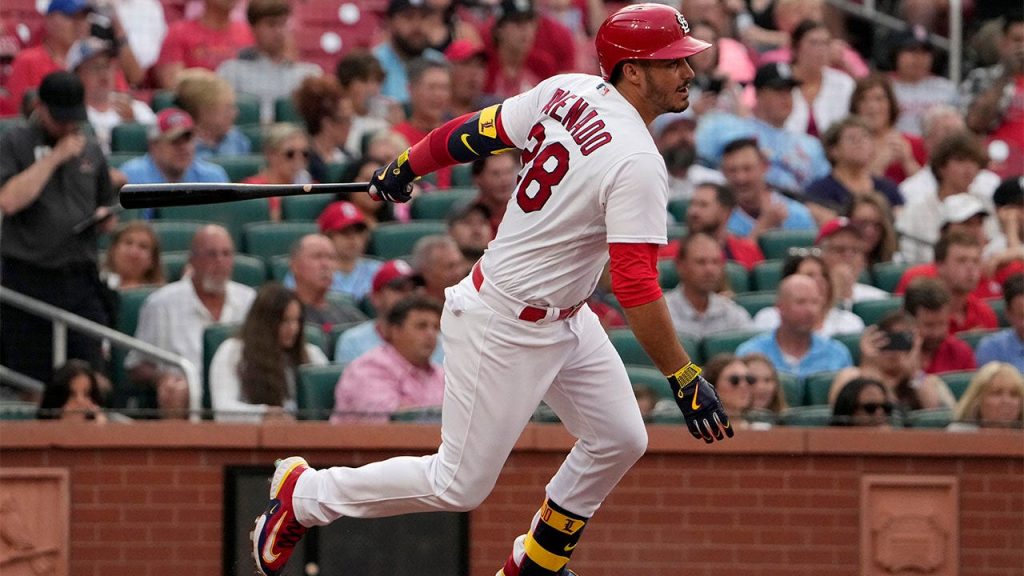Nolan Arenado’s future with the St. Louis Cardinals hangs precariously in the balance, with a potential trade looming large over the horizon. While the eight-time All-Star remains under contract for three more seasons, the Cardinals’ ongoing rebuild has positioned him as a prime trade candidate, a valuable asset that could fetch a substantial return to bolster their rebuilding efforts. However, Arenado’s no-trade clause significantly complicates any potential move, granting him the power to veto any trade proposal that doesn’t meet his approval. This effectively transforms a straightforward transaction into a complex negotiation, where the Cardinals must navigate Arenado’s preferences and identify teams that align with his desires.
The Houston Astros, seeking a replacement for the departing Alex Bregman, emerged as a potential landing spot for Arenado. Despite the Astros’ willingness to shoulder a significant portion of Arenado’s remaining $74 million contract, which extends through 2027, the trade talks ultimately collapsed due to Arenado’s refusal to waive his no-trade clause. While the exact reasons behind Arenado’s reluctance to join the Astros remain unclear, speculation abounds. Some suggest that Arenado, at 33 years old and still chasing his first World Series title, might view the Astros’ recent trade of Kyle Tucker as a step back, diminishing their championship aspirations. Other theories point to personal preferences or considerations beyond the realm of baseball. Whatever the reason, Arenado’s decision effectively closed the door on a potential move to Houston.
Arenado’s agent, Joel Wolfe, has indicated that while his client is open to considering a trade, he’s not willing to go just anywhere. The list of acceptable destinations, according to Wolfe, is “bigger than you would think,” suggesting a degree of flexibility while also implying a carefully curated set of criteria. This selective approach underscores Arenado’s desire to join a contending team with a realistic chance of competing for a World Series title, a goal that has eluded him throughout his illustrious career.
The New York Yankees and New York Mets have been mentioned as other potential suitors for Arenado’s services. However, reports suggest that the Yankees might not be an ideal fit, further narrowing the field of potential destinations. This highlights the challenge the Cardinals face in finding a suitable trade partner that aligns with both their needs and Arenado’s preferences. The situation echoes a previous instance in 2017 when the Cardinals were on the receiving end of a no-trade clause wielded by Giancarlo Stanton, then with the Miami Marlins, who ultimately vetoed a proposed trade to St. Louis before being traded to the Yankees shortly thereafter.
Arenado’s impressive resume, adorned with ten Gold Glove Awards, a career .285 batting average, and an .857 OPS, solidifies his status as one of the premier third basemen in baseball. His defensive prowess, combined with his consistent offensive production, places him on a potential Hall of Fame trajectory. With less than 200 hits separating him from the 2,000-hit milestone, Arenado continues to build a compelling case for Cooperstown. His next destination will undoubtedly play a significant role in shaping the final chapters of his career.
The ongoing saga surrounding Arenado’s future highlights the complexities of player movement in modern baseball. The presence of no-trade clauses empowers players, granting them a significant degree of control over their careers. While these clauses can complicate trade negotiations, they also serve as a crucial safeguard, protecting players from being forced into undesirable situations. For Arenado, the no-trade clause represents leverage, a tool to ensure his next move aligns with his personal and professional aspirations. As the Cardinals continue to explore trade possibilities, Arenado’s fate remains uncertain, a compelling subplot in the ever-evolving narrative of Major League Baseball.

